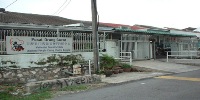RAMPS have been put up for the disabled in major shopping complexes, but some are too narrow to accommodate a wheelchair.
If you take TV programmes, only news segments are being sign-translated for the deaf, while tactile flooring to help guide the blind to safety is only provided on selected urban streets.
In short, the disabled are still made to be largely dependent on others to survive, let alone lead a "normal" life.
"Without (proper) facilities, getting out of the house is not only unfriendly but downright dangerous for the disabled," said Anthony Thanasayan, spokesperson for the Malaysians Against the Discrimination of the Disabled.
He admitted there have been more efforts in recent years to have disabled-friendly facilities, "but they’ve been largely sporadic and centred in Kuala Lumpur".
"A comprehensive plan is needed to provide facilities to help us be independent and productive members of the community."
Meanwhile, parents like Darshini Ganeson are worried that their children cannot get the proper training to become independent individuals because of the lack of "well-run" vocational institutions for the disabled.
She dismisses the special public schools for the disabled, saying they are of no help.
"If I had left Nanthini in her public school, she’d be a vegetable by now. They lump the children together — the autistic with the Down’s syndrome and the dyspraxic, like my girl.
"They must realise that each has different learning capabilities," said Darshini.
Malaysia has long been a signatory of the Convention on the Rights of the Child (CRC) — the most widely ratified human rights treaty in history.
Its article 23 upholds that children with disabilities be guaranteed "a full and decent life, in conditions which ensure dignity, promote self-reliance and facilitate the child’s active participation".
Earlier this year, a new treaty to ensure the human rights of people with disabilities opened for signature at the United Nations General Assembly.
The new treaty, which strengthens CRC’s Article 23, further advocates the human rights of an estimated 650 million disabled people in the world.
As of March 30, some 80 countries have signed the new Convention on the Rights of Persons with Disabilities.
Malaysia is not on the list of signatories but the Women, Family and Community Development Minister Datuk Seri Shahrizat Abdul Jalil said "we are working towards it".
"We want to have our groundwork in place first. Our legal advisers are working 24/7 to finalise the Persons with Disabilities Bill to be tabled in Parliament this year. Once we have that in place, we will sign the convention."
Presently, Malaysia has 170,000 registered disabled people. To facilitate the disabled, especially the poor, a new directive was issued last month for special counters for the disabled to be set up in every district welfare office.
"Just go and speak to my officers and they will help you," said Shahrizat.
Source : http://www.nst.com.my/Current_News/NST/Sunday/Focus/20070513085558/Article/index_html
Sunday, May 13, 2007
Subscribe to:
Post Comments (Atom)






No comments:
Post a Comment